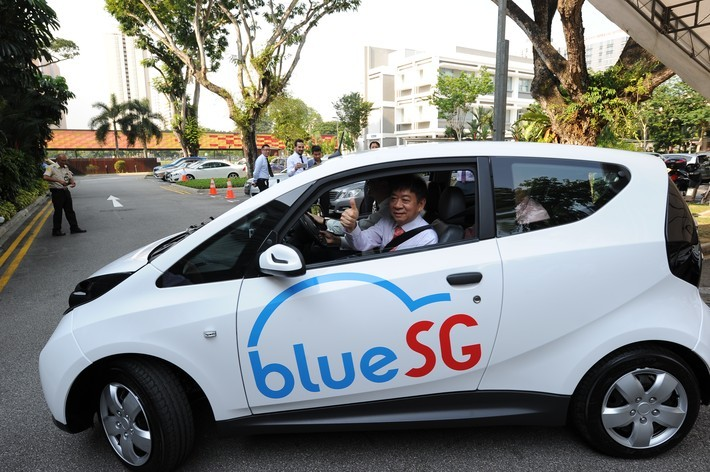By the middle of next year, Singapore residents will be able to zip around in electric vehicles (EVs) in heartland towns such as Ang Mo Kio, Jurong East and Punggol.
Drivers will be able to access 125 EVs and 250 charging points in these neighbourhoods; and by 2020, all housing towns will be able to share 1,000 EVs and 2,000 charging points across the country under its most ambitious EV programme to date.
Details of this initiative were unveiled on June 30 by the Land Transport Authority (LTA) and the Economic Development Board (EDB), which signed a landmark agreement with BlueSG, a unit of Bolloré Group, to operate a nationwide car-sharing programme with a fleet of 1,000 EVs.
When fully operational, this fleet will be the second largest in the world after Paris.
Speaking at the signing ceremony, Khaw Boon Wan, Coordinating Minister for Infrastructure and Transport, hailed the move as another step towards the country’s “car-lite vision”, which promotes the use of public transport and car-sharing to reduce pollution and greenhouse gas emissions.
“The future of transport in Singapore will look very different from today. Most people will not see the need to own a car,” he said.
He noted that while car-sharing has been widely adopted in Europe and is growing rapidly in the United States, it is currently a small market in Singapore.
“Today, we have a total fleet of only 300 shared-cars and 10,000 users. We hope to see car-sharing usage rise through collaborations such as this one we are signing today,” he added.
The dawn of car-sharing in the 21st century
Cedric Bolloré, vice president of development, Bolloré Group, noted in his speech at the signing that in the 21st century, some countries are “leading the way with a global vision which… improves the quality of life and protects the environment through political decisions, scientific research and disruptive technologies”.
“Singapore is one of these few countries which not only have understood that the word is at a turmoil and that it is time to rethink all our economic and industrial model, but which has also decided to act now,” he said.
Bolloré Group is the world’s largest EV car-sharing operator, with operations in Paris, Bordeaux and Lyon in France, Indianapolis in the US and Torino in Italy.
The company that manages all the electrical storage operations developed by the Bolloré Group, Blue Solutions, has been listed on the Euronext since 2013.
It was selected out of 13 participants in a Request for Information (RFI) exercise in December 2014, based on the quality of its proposal and its strong track record, said the government agencies.
The EV car-sharing programme will help to reduce pollution as EVs do not have tailpipe emissions, and enable more people to have access to cars without owning one, hence raising efficiencies, he noted.
According to a study by Nanyang Technological University’s TUM CREATE Centre for Electro Mobility, EVs could reduce primary energy consumption and CO2 emissions for personal transport by up to 50 per cent compared with the usual internal combustion engines (ICEs). They are also quieter than normal cars, reducing overall noise pollution.
Under the agreement, BlueSG will operate the programme for ten years and install an island-wide EV charging infrastructure of 2,000 charging points, of which up to 20 per cent will be available for public use.
After the contract period, the Singapore government will take over the charging points and make all of them available to the public, noted Minister Khaw. These charging points will form the foundation for Singapore’s future EV charging infrastructure to support the use of EVs.
About 80 per cent of the locations and charging points will be in the residential areas and the rest will be installed on streets and at commercial buildings.
“
The future of transport in Singapore will look very different from today. Most people will not see the need to own a car.
Khaw Boon Wan, coordinating minister, infrastructure and transport, Singapore
Unlike many car rentals, where users need to take the car back to the original location, users of BlueSG cars will have the flexibility to drop off the car at a BlueSG station near their destination.
The EV car-sharing is based on subscriptions and cars can be booked via an app. The cost of the journey is estimated to be less than S$10 for a 15-minute journey.
Boosting research in Singapore
The EV car-sharing programme is set to deliver several economic and research benefits for Singapore.
BlueSG, in partnership with EDB, will undertake new high-value economic activities and create about 250 jobs in Singapore in the first five years of the programme.
It will also be setting up a Global Innovation Centre to conduct research and development (R&D) in the areas of mobility and energy management solutions.
In addition, it will be establishing its Asia Pacific headquarters in Singapore to oversee its e-mobility, energy management and system integration business for the region.
The company said it will position its EV fleet as the world’s first “Open Innovation Platform” that involves a large-scale vehicular fleet, and will partner local and foreign companies and research organisations.
Together, they will develop, test and commercialise cutting-edge mobility and energy management solutions such as next-generation charging technologies, intelligent transport systems and self-driving vehicles.
All of these initiatives, including the car-sharing aspect, represent an investment of S$100 million into the country, said Bolloré.
EDB managing director Yeoh Keat Chuan noted that the move will “position Singapore as the regional leader in electric mobility and energy management technologies”.
“The programme will serve as a living lab platform to attract new players to develop, test and commercialise innovative urban solutions here before scaling up for the region,” he added.

